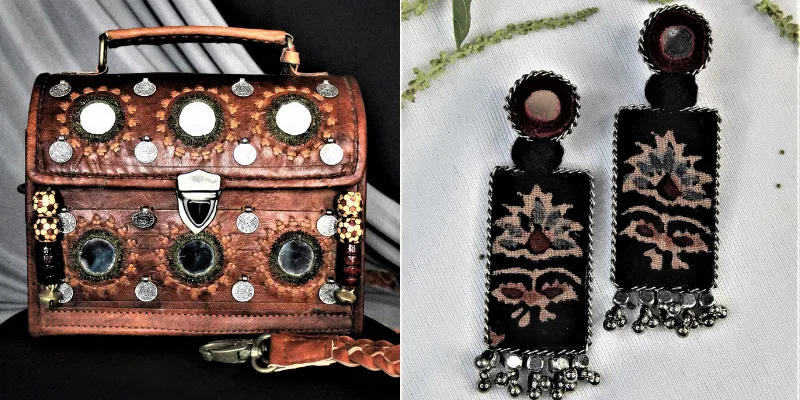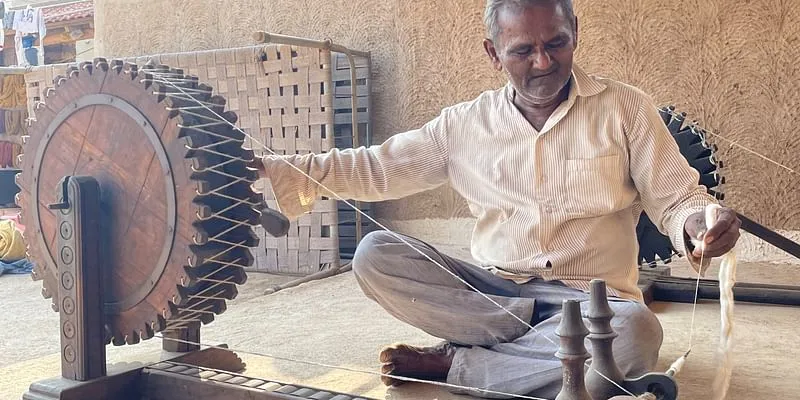From the Rann of Kutch, how this artisan and his friend built a D2C marketplace for a centuries old art form
Sufiyan Khatri hails from a family that has been into Ajrakh block printing for 11 generations. When the pandemic hit, his artisans' community suffered massively. This is when he met Juned. Together, they created an ecomm platform for Kutch artisans, which now gets close to 1000 orders per month
Kutch nahi dekha, toh kuch nahi dekha (If you haven’t see Kutch, you haven’t seen anything) goes the tagline made famous by Bollywood actor Amitabh Bachchan in a Gujarat tourism advertisement.
Kutch is known for Great Rann of Kutch - a vast stretch of white salt desert that is often touted as one of the most sought-after tourist attractions in India. But beyond those beautiful sights, one cannot ignore the fact that the vibrant land of Kutch is home to varied crafts as well.
The artisanal crafts of Kutch have a global imprint but unfortunately, during COVID-19, the artisans here struggled to meet even basic necessities.
“The life of the artisans in Kutch is very challenging. Big brands take the craftwork and sell at exorbitant prices, which isn’t a problem. However, the artisans are on daily wages, they aren’t able to lead a quality life,” says Sufiyan Khatri, Co-founder of KutchiBazaar, an online marketplace that brings you authentic, handmade products from Kutch.
Sufiyan hails from a family that has been into Ajrakh block printing for 11 generations! He works with a group of artisans in Ajrakhpur supplying hand block printed fabrics and products from the Kutch region to companies pan India.
In January 2020, in the usual course of business, Sufiyan had purchased inventory worth Rs 20 lakh to Rs 25 lakh, but when the COVID-19 virus struck India in March 2020, brands, ecommerce companies, and customers refused to pick up their orders, and business came to a grinding halt. This dealt a huge blow to Sufiyan and 150 associated artisans who were dependent on the income from these orders.
“It was the most overwhelming period,” Sufiyan says, adding that the business was at its lowest and there were no takers. Though Sufiyan managed to help artisans with the ration kits, successive lockdowns posed more stress.

Handmade products by KutchiBazaar
As the restrictions eased, business started going back to normal, but at a slower pace. At the time, ecommerce marketplaces like iTokri, Jaypore, Gaatha, Sundarii, among others helped Sufiyan and his artisans survive by buying products from him.
Throughout the grim period though, Sufiyan always kept thinking of a solution to give artisans due credit for their hard work, and a sure shot means of livelihood.
And thus, as famous author Paulo Coelho once said, 'when you want something, all the universe conspires in helping you to achieve it,’ it was evident that in Sufiyan’s case too, the stars aligned in December 2020.
At a family wedding, Sufiyan unexpectedly met Juned Khatri, a family friend and conversations eventually led to Kutch crafts and the struggles that artisans were facing. The duo ideated about opening an online marketplace for artisans to showcase and sell their products directly to the consumers. This is how KutchiBazaar came into being in March 2021.
The genesis
Sufiyan and Juned together built an ecommerce website showcasing varied crafts of Kutch including Ajrakh, Bandhani, Batik, Shibori, and Bhujodi in the form of fabrics, suits, stoles, sarees, accessories, and home furnishings.
Speaking to SMBStory, Juned says they procure products from Kutch artisans giving them credit for their work.
“We aren’t just taking the products and selling them to customers. We are helping them make informed decisions about the products and its maker. This boosts the confidence of the artisan as he/she feels privileged knowing that their customers know them.”
In just over nine months, KutchiBazaar has got decent response from the market getting around 900-950 orders a month, and Juned claims that the return rate of the customers is 10-15 percent.
“Though the return rate is lesser compared to industry standards, as we are operating on a smaller scale in comparison to other portals, we are doing fairly well,” he adds.
KutchiBazaar products are also sold internationally. Sufiyan asserts that they are making the best use of digital media and marketing by making videos of their products, helping customers understand how the fabric is weaved and block printing is done.
The company sources fabrics locally from India and weaves in its own facility in Ajrakhpur to make the finished product.
KutchiBazaar’s monthly revenue is around Rs 20- Rs 25 lakh. So far, the founders have together invested Rs 50 lakh as bootstrapped capital and the company is now in talks to list its products on Amazon and Mirraw.
The Kutch craft lineage
According to Sufiyan, the Ajrakh craft is hundreds of years old and has been passed on from generation to generation. In the 50s though, the art faded for about 20 years. It was at this time that his grandfather decided to bestow the art to his children and grandchildren in an effort to not let the craft die a natural death.
“That time, Ajrakh craft was used in turbans and lungis. We didn’t know that other products could also be made,” Sufiyan tells SMBStory.
One thing led to the other and Sufiyan says, “we slowly got more exposure to the outside world and started the craft in sarees and dupattas around the 80s.”
‘Digital’ is a challenge
When asked about challenges he faces, Sufiyan remarks it is making customers understand the value of a handmade product.
“You see there are a lot of digital prints available in almost all the crafts. And these are available at much lower prices. So, if someone wants an original Ajrakh that takes almost 16 days in the making, the price would be higher, as it takes a lot of effort. But they will compare it with the digital print price.”

KutchiBazaar manufacturing facility
There’s also a lot of duplicacy in the market, Sufiyan says, which adds to the burden.
Another shortcoming Juned talks about is logistics issues in the region, and timely deliveries to customers getting affected.
The way forward
Throwing light on the immediate goals, Juned says that they want KutchiBazaar to have maximum reach across the globe. They are also in the process of onboarding as many artisans as possible to make different kinds of Kutch crafts reach beyond set boundaries.
Sufiyan and Juned are also looking forward to collaborating with partners for funding as they say they are close to reaching a breakeven in just under a year. The duo are hoping to receive some funding soon to scale up and expand their reach.
Edited by Anju Narayanan









